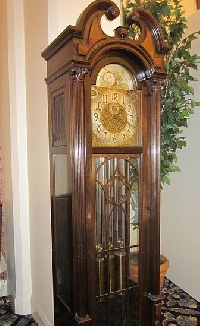How to care for antique grandfather clocks
By Catalogs Editorial Staff

Knowing how to care for antique grandfather clocks saves them for lifetimes
Like many antiques, antique grandfather clocks require a level of care and maintenance that modern clocks do not. In return, you get a beautiful piece of history and functional furniture.
For many owners, the grandfather clock is a treasured family heirloom. The name alone evokes a rich sense of history and an item you may want to pass on to the next generation.
The ?long-cased? clock was introduced in 1670 and became extremely popular in the 17th century. Song writer Henry Work referred to these clocks as ?grandfather clocks? in an 1876 song called ?My Grandfather?s Clock?, and the name stuck. Though charming and finely crafted, antique grandfather clocks are delicate compared to modern clocks and must be cared for regularly. If one grandfather clock part goes, the integrity of the entire clock can quickly degrade.
Tips to Care for Antique Grandfather Clocks
Position the clock on a level surface
Grandfather clocks were built for flat surfaces. Place a level on the floor to make sure the surface are for your antique grandfather clock is flat. If it it?s not, place the level on your grandfather clock and use shims to adjust to clock until the level indicates even alignment.
Most grandfather clocks operate with weights and pendulums. If the clock has a tilt, half the parts will bear more pressure and require repair.
Keep the clock running
Grandfather clocks are not meant to sit in a storage space unused. If the clock does not run for a long period of time, about a month, the parts lose lubrication and the metals can turn brittle. For the same reason, if you?re planning to purchase a grandfather clock, ask how long it has gone without power.
~
Maintain weight alignment
You can tell if the weights are off balance when your antique grandfather clock fails to keep the correct time. Imbalanced weights cause the clock?s mechanisms to wear down or break by putting too much pressure on some or all of the components.
Give it the works every 10-15 years
Antique grandfather clocks endure a lot of wear and tear over the years. Avoid a complete breakdown and make sure you?re caring for the clock properly by having it serviced every 10-15 years. During a ?service? a clock expert will clean and oil the clock parts. Some professionals recommend having grandfather clocks serviced every 5 years. You may want to let the condition of your clock determine the frequency of professional maintenance.
Protect your grandfather clock from heat and humidity
Keep this in mind when choosing your clock?s location: heat and humidity are a grandfather clock?s worst enemy. Antique clock mechanisms rust easily and cannot withstand extreme temperatures. Ideal room conditions for an antique grandfather clock include sufficient ventilation and ample protection from direct sunlight.
Setting the time
Move only the minute hand to set the time on an antique grandfather clock. Moving the hour hand can damage the clock. If you need to adjust the time more than a few minutes, stop the pendulum first and move the minute hand until the time is correct. Start the clock ticking again by pushing the pendulum to the far left. Note that trying to adjust the time when the clock is chiming can damage the clock.
Winding
Winding a grandfather clock is simple. If it winds with a key, place the key in the hole and gently turn it until the clock is fully wound, you?ll hear it stop or feel resistance. If the clock relies on chains to run, slowly pull one chain at a time until each weight is just beneath the clock?s face.
Care for your grandfather clock and it will grace your home with hourly chimes for many years to come.
References:
Decor Medley: Grandfather Clocks
Home Furnish: Grandfather Clock FAQs
Popular Savings Offers











